Best Diet to Lose Weight: 10 Diets for Healthy Weight Loss
Weight loss is associated with a decreased likelihood of chronic disease, but it’s important to note that not all weight loss diets are beneficial to your overall health. In this article, we will look at 10 diets that prioritize healthy weight loss.
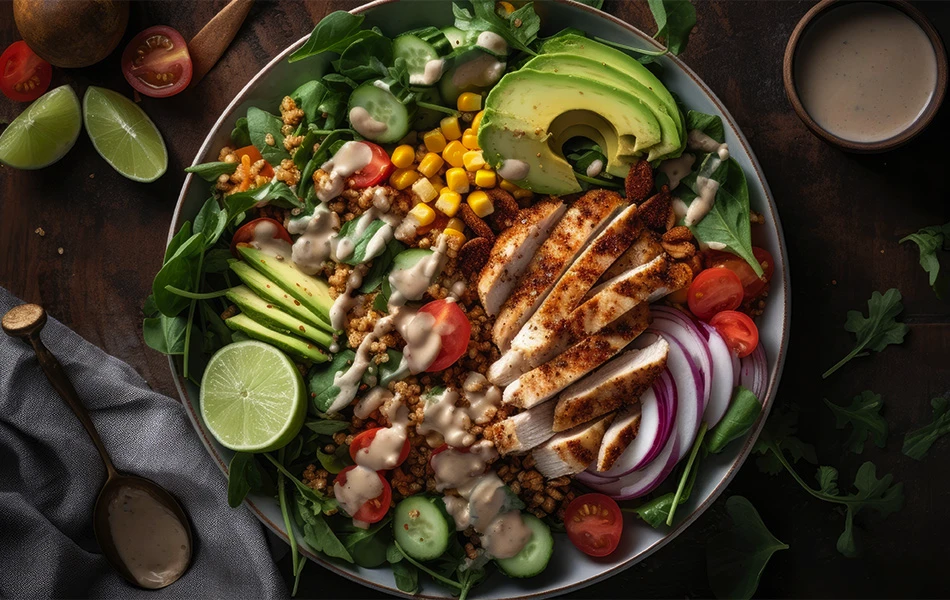
Whether your goal is to fit into your favorite pair of jeans or to improve your health, it’s important to choose a diet that not only facilitates weight loss but also provides additional health benefits.
The most effective weight loss diets go beyond simply counting calories and emphasize a well-rounded approach that includes a variety of foods and promotes healthy habits such as stress management, adequate sleep, and regular exercise.
While there isn’t a one-size-fits-all diet for everyone, the variety of options ensures that you can find one that’s tailored to your specific dietary needs and personal preferences. To help you in this endeavor, we have compiled a comprehensive overview of the top ten diets that promote both weight loss and overall health.
#1 Mediterranean Diet
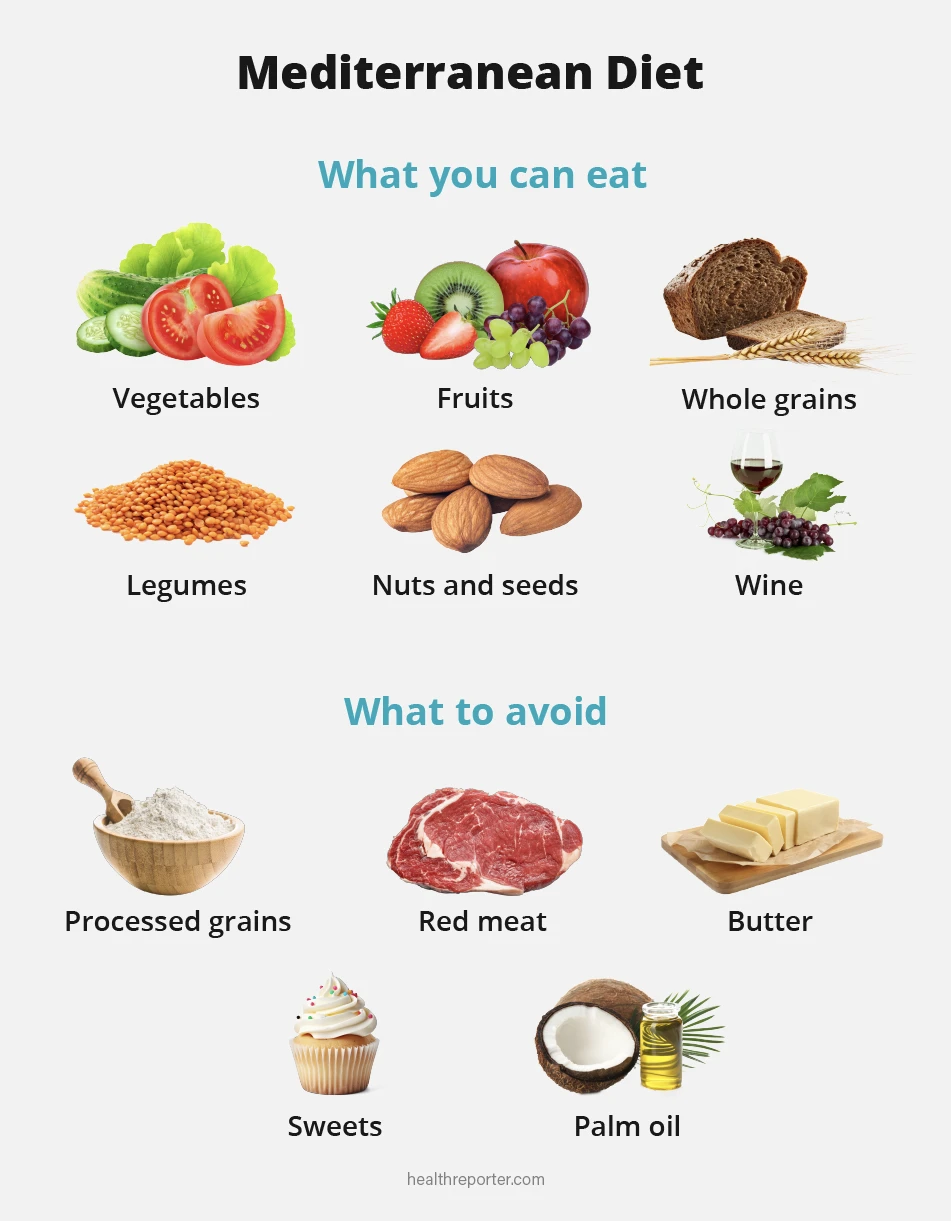
The Mediterranean diet is a style of eating based on the dietary habits of people living in countries bordering the Mediterranean sea. Their meals consist mainly of fresh, seasonal, locally grown produce and very little processed foods.
It is a predominantly plant-based diet with a focus on vegetables, fruit, legumes, nuts, and whole grains. Small portions of fish and chicken are the main sources of animal protein, and red meat is only enjoyed occasionally.
Dairy products in the form of cheese and yogurt are eaten in small quantities every day, and fruit is enjoyed after meals as dessert instead of high-sugar sweets and treats, which are only eaten a few times per week.
Olive oil is the main source of added fat, which is responsible for many of the health benefits associated with the Mediterranean diet.
The nutrient-dense foods included in the Mediterranean diet contain significant amounts of antioxidants, vitamins, minerals, and dietary fiber. Combined with healthy fats, the diet is good for overall health, including brain, heart, and gut health.
Scientists believe that one of the reasons the Mediterranean diet is effective for weight loss is the anti-inflammatory and antioxidant effect due to the omega-3 fatty acid and bioactive compound content.
Additionally, a typical Mediterranean meal is high in fiber from fresh vegetables. Combined with small amounts of plant or animal protein and healthy fats, the meals have a high satiety value, making it easier to naturally reduce your calories.
The weight loss effects of the Mediterranean diet compare favorably to other weight loss diets, including low-fat, high-protein, and low-carb diets. It has also been shown that it is less restrictive than other diets (you can even eat pasta), and it is a diet that is relatively easy to stick to for long-term results.
- Weight loss
- Improves insulin resistance and blood sugar
- Lowers cholesterol levels
- Reduces chronic inflammation
- Promotes a healthy gut microbiome
- Supports brain health
- Reduces the risk of cardiovascular disease
- Longevity
- Because of the healthy fat content, weight loss might not be as significant
- The iron content of the Mediterranean diet may be too low for those with low iron levels
- May not be suitable for people with food intolerances such as celiac disease or lactose intolerance
#2 DASH Diet
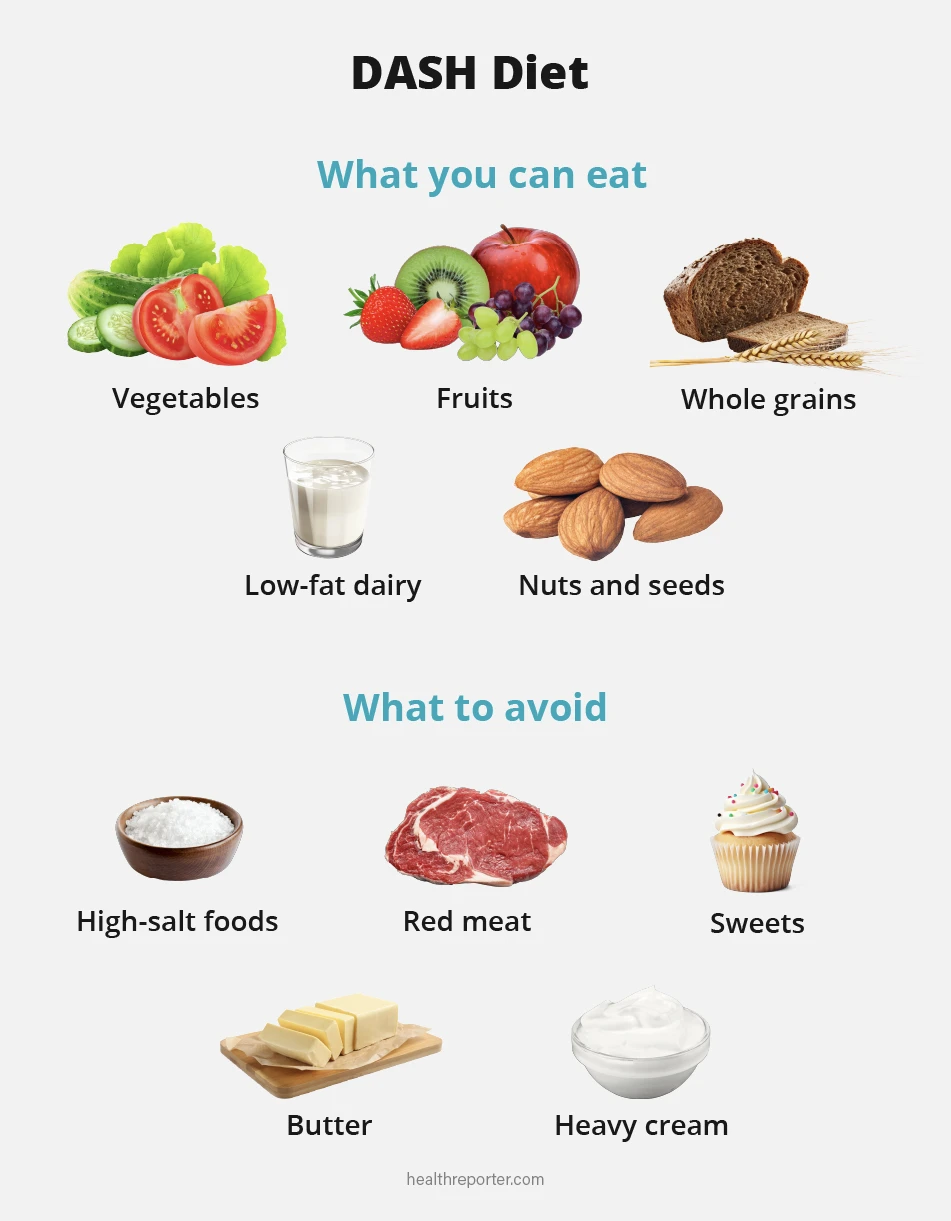
DASH stands for Dietary Approaches to Stop Hypertension. As the name implies, the DASH diet was originally designed to help people control high blood pressure and reduce their risk of heart disease.
The DASH diet includes foods from all food groups emphasizing fruit, vegetables, whole grains, fat-free or low-fat dairy, such as fat-free yogurt and cottage cheese, lean protein, such as fish and chicken, beans, nuts, seeds, and healthy fats from vegetable oils.
To promote heart health, the diet is low in saturated fat and sodium. Therefore, fatty meat, full-fat dairy products, sugar, salt, and processed foods are restricted.
When combined with other health-promoting habits such as regular physical activity, stress management, and getting enough sleep, the DASH diet has been shown to have numerous health benefits other than lowering blood pressure.
Research shows that people who follow the DASH diet can reduce their risk of heart disease, stroke, and cancer. The diet lowers both systolic and diastolic blood pressure, as well as total cholesterol and LDL-cholesterol levels.
In addition, studies show that by controlling your calorie intake and increasing your intake of nutritious foods, the DASH diet may promote weight loss. A diet high in vegetables and fruit naturally provides fewer calories which may lead to weight loss.
- Lowers blood pressure
- Improves cholesterol levels
- Weight loss
- Reduced risk of diabetes
- Reduced risk of heart disease
- Not suitable for people with chronic kidney disease, chronic liver disease, or uncontrolled blood sugar levels, heart failure, celiac disease, and lactose intolerance
#3 Plant-Based and Vegan Diets
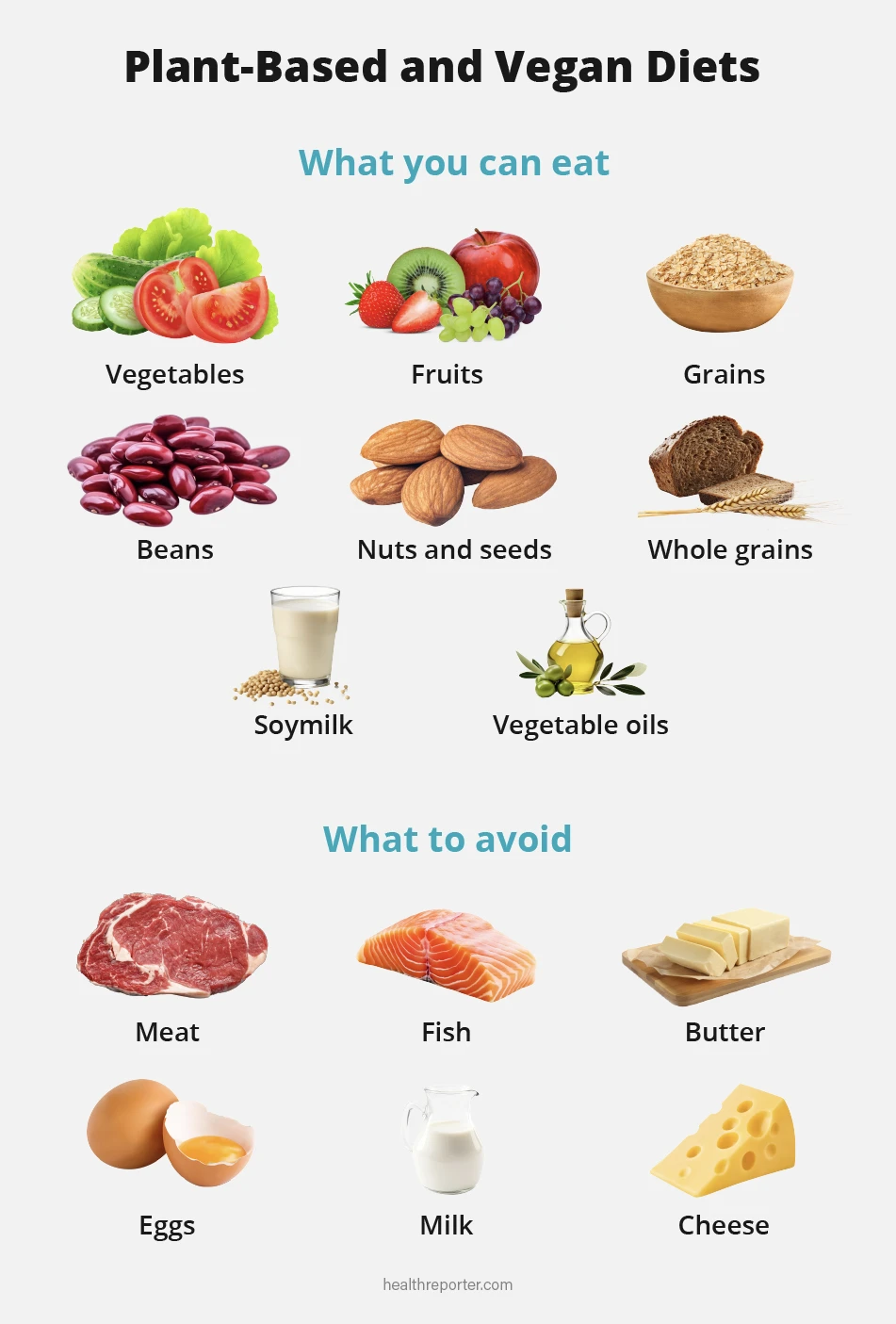
Plant-based diets take many forms, ranging from a vegan diet to a vegetarian diet, pescatarian diet, and flexitarian diet. However, they all have one thing in common. The majority of your food intake comes from plants.
Vegan diets are 100% plant-based and include plant-based sources of protein such as tofu, beans, lentils, chickpeas, and nuts. To ensure a balanced diet, protein foods are eaten with a variety of whole grains, vegetables, nuts, seeds, and fruit.
A vegetarian diet may include eggs and dairy products as additional sources of protein, while someone who follows a pescatarian diet also includes fish in their meals.
Those who don’t want to give up meat altogether but want to enjoy the benefits of a vegetarian diet can follow a flexitarian diet, which is similar to the Mediterranean diet. In this case, most of your meals are plant-based. However, some of them include meat.
Whichever plant-based diet you choose to follow, you will eat fewer calories and saturated fat and more fiber, vitamins, minerals, and phytonutrients. As a result, you may enjoy a host of health benefits.
People who follow a vegan or vegetarian diet have been shown to have lower LDL cholesterol levels and blood pressure. They also have a reduced risk of developing diabetes, heart disease, and certain cancers and enjoy better gut health than those eating meat every day.
Additionally, a plant-based diet may help with weight loss. Research suggests that the lower fat and overall calorie intake associated with eating primarily plants may contribute to weight loss.
It is also possible that bioactive plant compounds such as polyphenols, flavonoids, phenolic acids, and alkaloids contribute to better fat metabolism and less fat storage, helping you lose weight and maintain a healthy weight.
- Weight loss
- Lower cholesterol levels
- Lower blood pressure
- Reduced risk of diabetes
- Better heart health
- Good gut health
- Reduced risk of cancer
- Low intake of vitamin B12 may result in deficiency
- Low levels of vitamin D and calcium may affect bone health
#4 MIND Diet
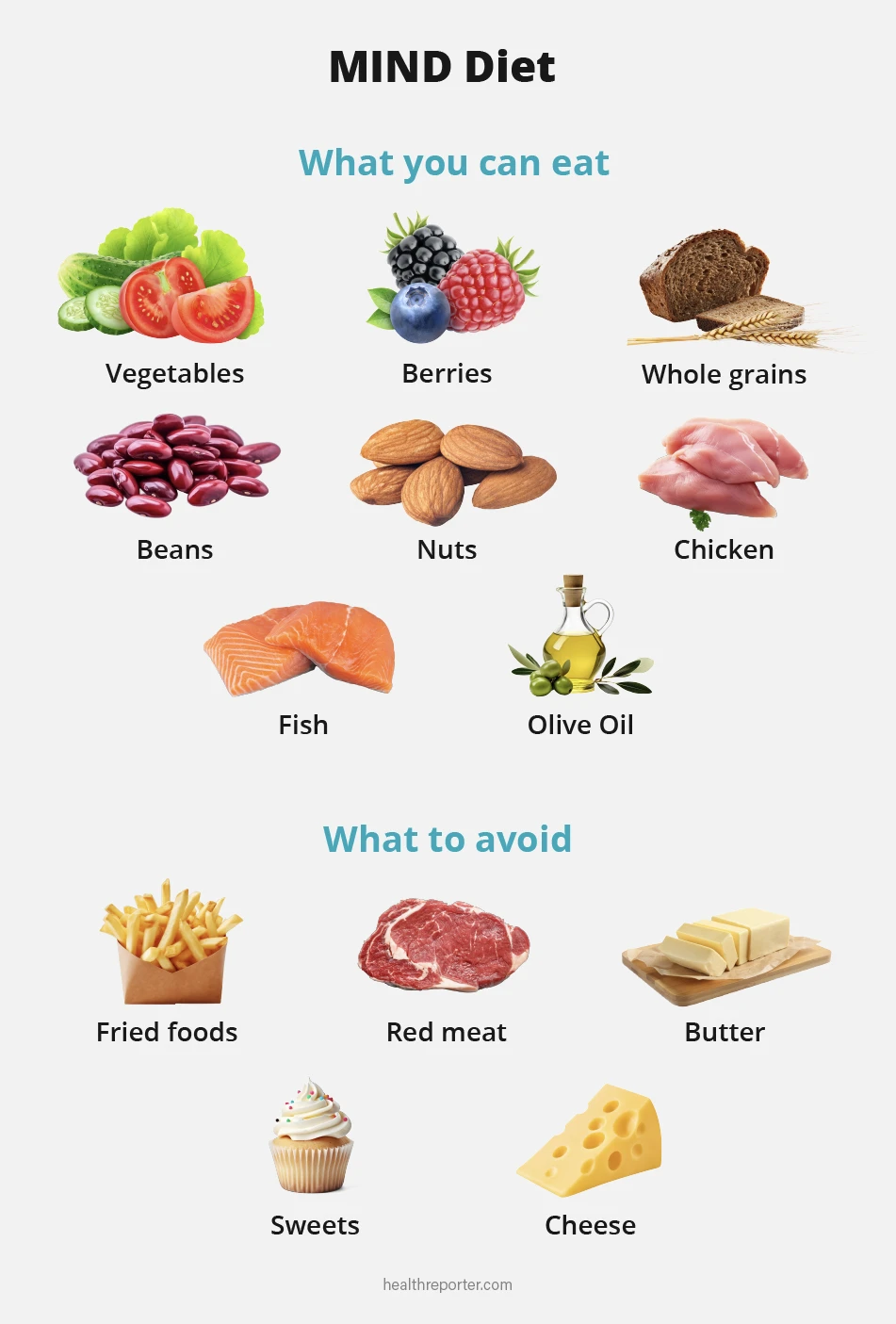
The MIND diet was created by scientists working in the field of neurodegenerative disorders such as dementia and Alzheimer’s disease. It stands for Mediterranean-DASH Intervention for Neurodegenerative Delay.
The diet brings together the most beneficial elements of the Mediterranean diet and the DASH diet, including foods from all food groups, to support optimal brain health with the intake of healthy fats and nutrient-rich foods to reduce inflammation and oxidative stress.
The MIND diet encourages people to eat plenty of vegetables, especially leafy greens, nuts, berries, beans, whole grains, fish, chicken, and olive oil. On the other hand, red meat, butter, cheese, pastries, fried food, and processed foods are discouraged.
The low saturated fat content and the high level of protective antioxidant and anti-inflammatory plant compounds in the MIND diet help to protect cognitive health. However, the diet offers other health benefits too.
Similar to the Mediterranean and DASH diets, the healthy foods in the MIND diet are good for heart disease, blood sugar control, and reducing the risk of certain cancers.
A recent study on the effect of the MIND diet on obese women found that the diet may also promote weight loss. The participants who followed the MIND diet lost more body weight and body fat than those in the control group.
- Brain health
- Reduced risk of Alzheimer’s disease
- Reduced chronic inflammation
- Heart health
- Better blood sugar control
- Weight loss
- Longevity
- Some of the foods included in the MIND diet may be expensive and unavailable in some areas
- No emphasis on habits such as regular exercise, sleep, and stress management
#5 WW (Formerly Weight Watchers)
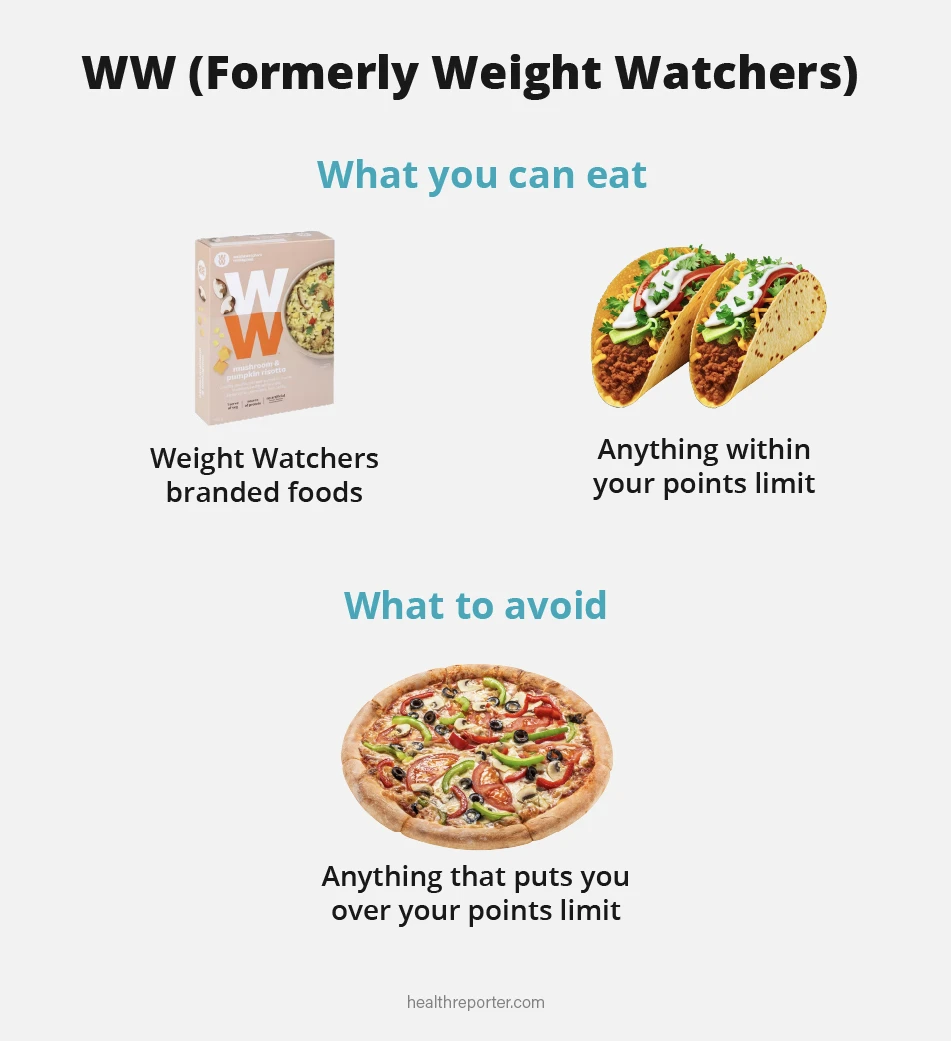
The WW weight loss philosophy is following a meal plan that fits your lifestyle rather than demanding that you completely overhaul your diet and eliminate all the foods you love.
Pizza, pasta, and burgers are still on the menu alongside meals packed with fiber and protein that form the foundation of healthy eating. The goal is to change your relationship with food so you can enjoy everyday meals and special occasions without feeling guilty about your food choices.
When you sign up, a personalized plan is created for you based on your answers to a quick quiz to determine your metabolic rate. However, it is not a conventional diet plan. Instead of a strict set of mealtime rules, you are allocated a point budget.
The point system is a unique way to encourage you to eat healthy foods while having a daily point or calorie budget for those foods and drinks you don’t want to have to go without.
Healthy meals consist of foods from the ZeroPoint foods list. They are typically foods such as low-carbohydrate vegetables, fruit, legumes, fish, poultry, and fat-free dairy products.
Other foods are allocated points based on how much added sugar, fiber, fat, and protein they contain. These points must be subtracted from your daily budget when you eat these foods.
You can use your points budget as you please, making it possible to navigate office birthdays, date nights, and picnics with your kids. On top of that, you have access to the WW app to track your calorie intake, water, sleep, and exercise.
WW is primarily a weight loss diet. However, research in obese women has shown that following the WW diet plan may offer some health benefits and results in better LDL cholesterol levels.
- Weight loss
- Access to support via the app
- Tracking of food, exercise, water, sleep, and weight loss
- All foods are allowed
- Focus on healthy foods
- Lower LDL cholesterol levels
- Diabetes program
- No guarantee that your diet will be healthy
- Too flexible for those who need a more structured diet plan
#6 Intermittent Fasting
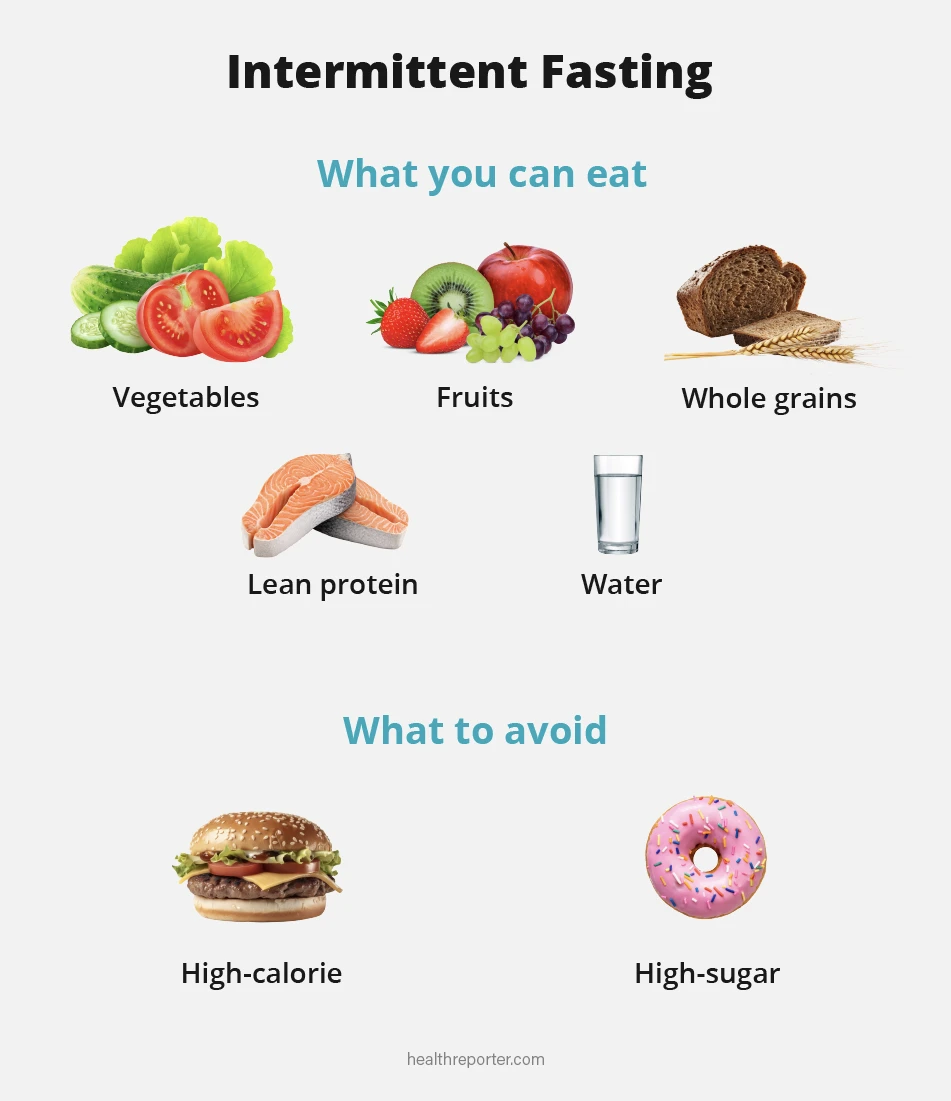
Intermittent fasting has become a popular way to lose extra pounds. This lifestyle approach to weight loss includes several methods of fasting, all of which not only help with weight loss but offer some health benefits too.
Most conventional weight loss diets encourage you to eat at least 3 times per day and begin your day with a healthy breakfast. When you do intermittent fasting, you may only eat once a day or extend your overnight fast so that you skip breakfast.
Intermittent fasting is not the same as not eating at all. You will initially lose weight if you starve yourself, but it is not sustainable as your body goes into starvation mode and starts conserving energy to keep you alive.
On the other hand, intermittent fasting means that you fast for specific periods every day or week. By reducing the amount of time you have to eat, you naturally reduce your daily calorie intake, which will promote weight loss.
The most common forms of intermittent fasting are alternate-day fasting, the 5:2 diet, and time-restricted eating. Each approach is beneficial for losing weight. However, you must choose the one that best fits your lifestyle.
- Alternate-day fasting: You alternate between eating your normal diet on one day and either completely fasting or eating only one meal the next day.
- 5:2 diet: You eat your normal healthy diet on 5 days of the week and fast on 2 days. When you follow the 5:2 diet, your fasting days may or may not be consecutive days.
- Time-restricted fasting: This method of intermittent fasting involves extending your overnight fast to 14–16 hours, giving you a feeding window of only 8 hours per day to consume your calories.
Intermittent fasting can improve your overall health. Research has shown that it supports brain health, improves blood sugar control, reduces your risk of diabetes, improves sleep quality, lowers blood pressure and cholesterol levels to improve heart health, and reduces chronic inflammation.
- Weight loss
- Brain health
- Blood sugar control
- Lower blood pressure
- Lower cholesterol levels
- Better sleep
- Reduced chronic inflammation, reducing the risk of conditions such as Alzheimer’s disease, arthritis, and stroke
- Intermittent fasting is generally safe for most people. However, if you have a pre-existing health condition such as diabetes, kidney stones, and gastroesophageal reflux disease, you must consult with your healthcare practitioner before you start fasting.
- There are some side effects of intermittent fasting that are usually short-lived. They usually resolve once your body adapts to your new lifestyle. They include fatigue, hunger, insomnia, headaches, and nausea.
- Not suitable for pregnant or breastfeeding women.
#7 Volumetrics Diet
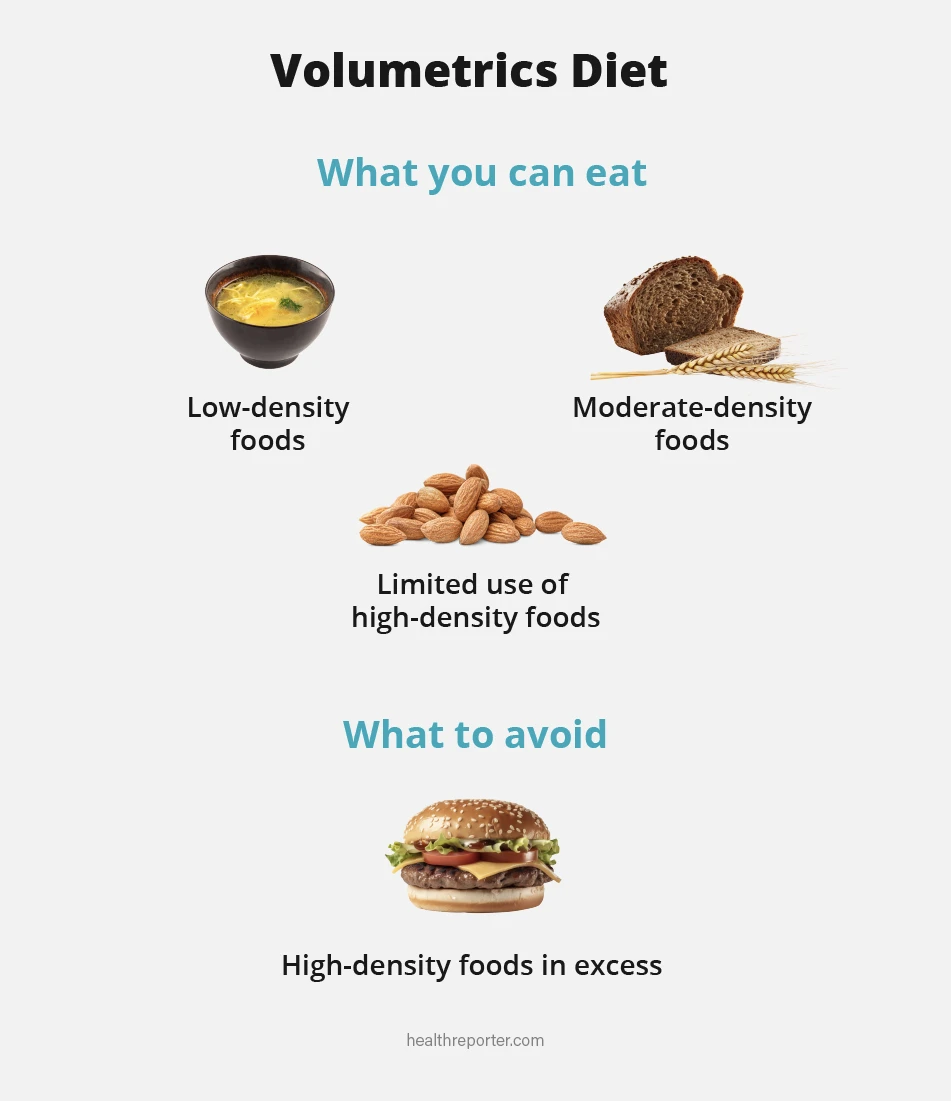
The Volumetrics Diet is a healthy eating approach to weight loss. It focuses on nutrient-dense foods that are low in calories and high in water. Therefore, the types of foods you eat on the volumetrics diet are bulky, adding a lot of volume to your plate but fewer calories.
Foods are grouped into four categories according to energy density:
- Category 1: Very low-density foods that contain a lot of fiber and water, such as fruit, non-starchy vegetables, avocado, broth-based soups, and non-fat dairy.
- Category 2: Low-density foods which are also fiber-rich. They contain less water, making them more energy dense, such as whole grains, legumes, and lean meats.
- Category 3: Medium-density foods that contain less fiber but still contain a fair amount of water. They have a higher ratio of calories to volume and include fatty meats, refined carbohydrates, full-fat dairy, and cheese.
- Category 4: High-density foods give you the most calories per volume. They typically have a high fat content and a low fiber and water content. They include foods like nuts and seeds, butter, margarine, olive oil, sweet treats, chips, pretzels, and fast foods.
For weight loss, most of your foods should be from categories 1 and 2, saving those in categories 3 and 4 for treats and special occasions.
That means you will be eating a largely plant-based diet that includes mostly vegetables and some fruit and fiber-rich carbohydrates, and small portions of lean proteins such as lean red meat, skinless chicken, and white fish.
Consequently, although the volumetrics diet has not been extensively studied, it may be beneficial for blood sugar control, blood pressure, and managing chronic inflammation.
- Weight loss
- Satiety
- Encourages regular exercise
- Limits processed foods
- Nutrient-dense
- Flexible
- Sustainable
- Low in saturated fat
- Low in healthy fats
- Recommended foods may be expensive and unavailable in some areas
- Time-consuming
#8 The Mayo Clinic Diet
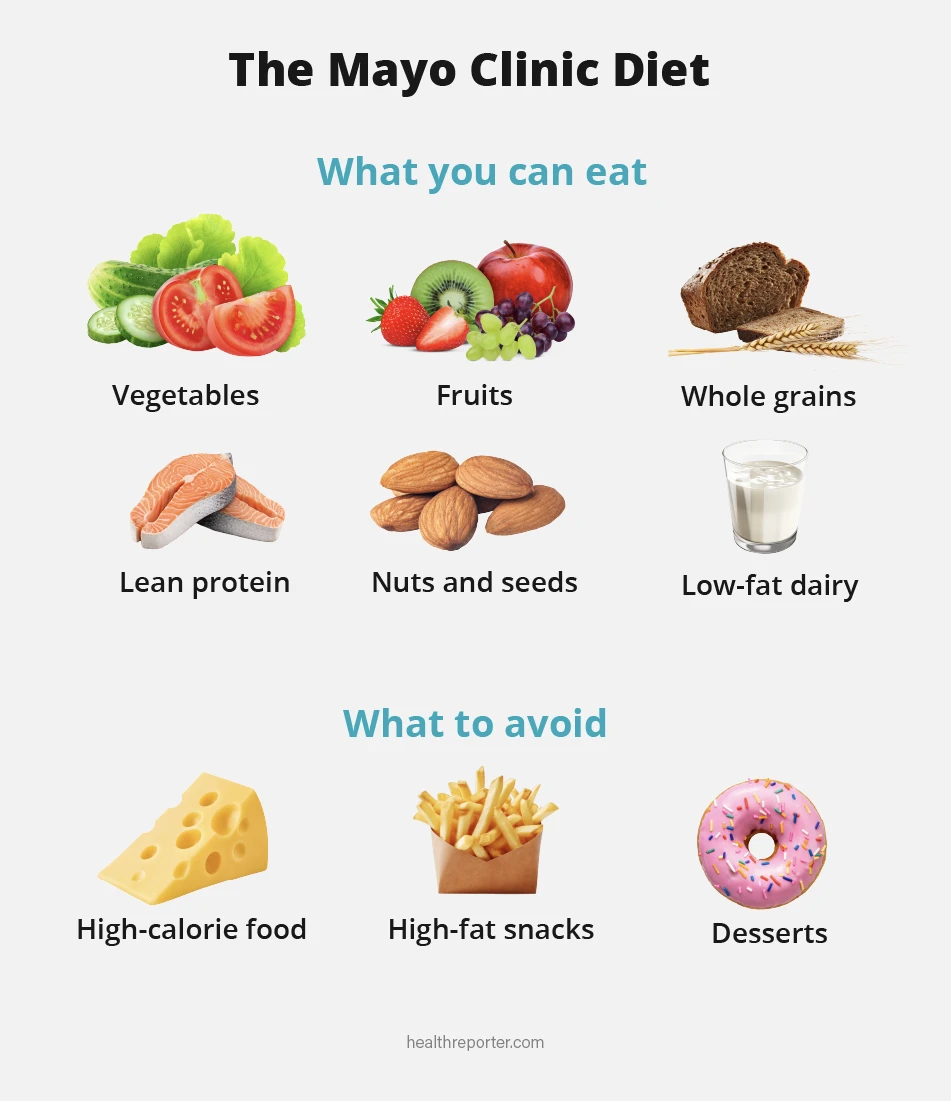
The Mayo Clinic Diet was developed by a team of nutrition and weight loss experts at the Mayo Clinic. It is a weight loss diet that encourages regular physical activity and other healthy habits.
The first step is an assessment to learn your reasons for wanting to lose weight, your current lifestyle habits, and your weight loss goals. Then, your recommended daily calorie intake is calculated, and you select a meal plan that can be customized to meet your needs.
The Mayo Clinic Diet program offers support in the form of an app, a habit tracker, a weight tracker, a food and exercise journal, and group coaching sessions. You also have access to a collection of how-to videos and a Facebook group.
The support continues once you have reached your goal weight, and you are encouraged to continue tracking your diet and exercise on the Mayo Clinic Diet app to help you maintain your weight loss for long-term success.
Because most of the foods included in the Mayo Clinic Diet are vegetables and fruit, and you are encouraged to develop 5 healthy habits, the lifestyle plan also offers several health benefits.
Research consistently shows that a diet high in fruit and vegetables, along with regular exercise, can reduce your risk of heart disease, cancer, and diabetes.
- Weight loss
- Heart health
- Reduced risk of diabetes and cancer
- Lower blood pressure and cholesterol levels
- Development of new health-promoting habits
- Ongoing support
- Time-consuming
- Low in healthy fats
- Membership fees
- Foods may be expensive and unavailable in some areas
- Temporary gastrointestinal discomfort due to sudden increase in dietary fiber
#9 TLC Diet
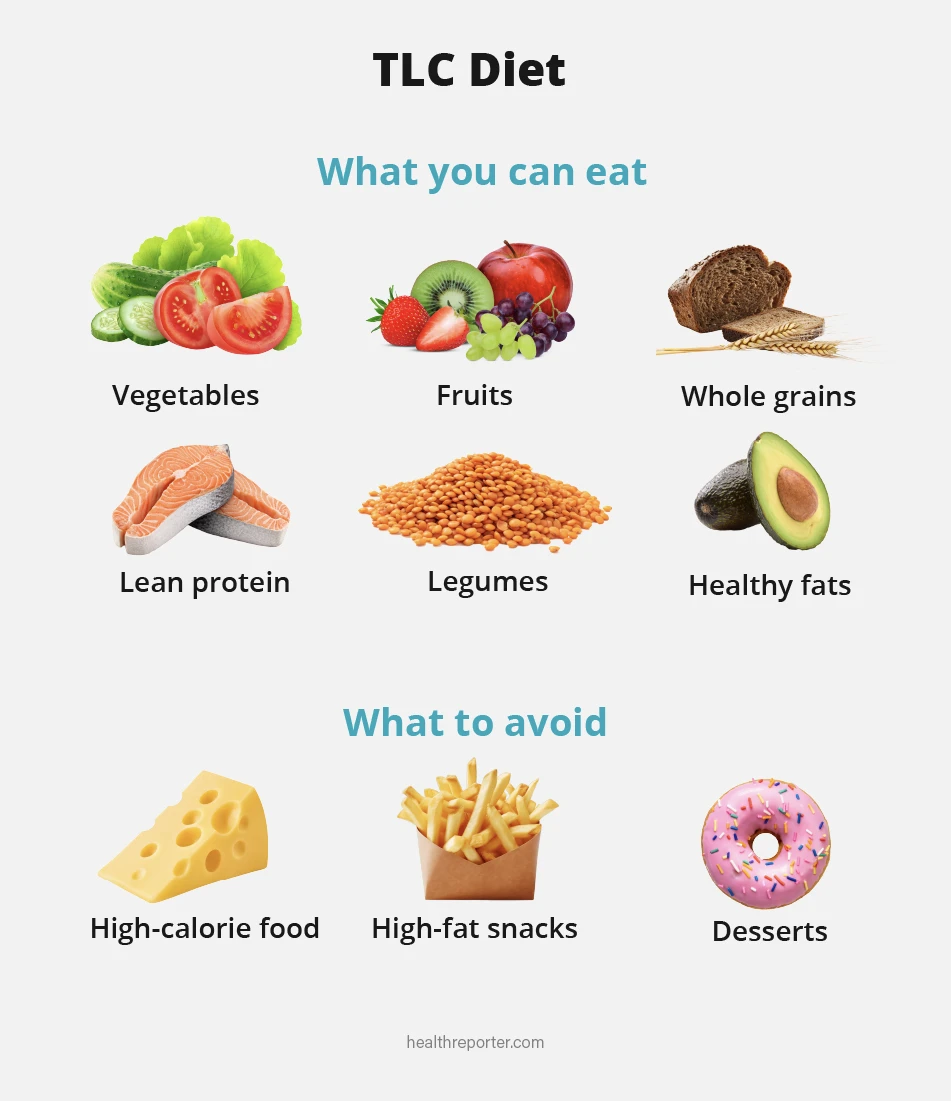
The Therapeutic Lifestyle Changes, or TLC diet, was developed by the National Heart, Lung, and Blood Institute as a tool for lowering cholesterol levels. Therefore, the goal of the diet is to promote heart health by eating heart-healthy foods prepared using heart-healthy cooking methods.
The TLC diet is a 3-part program including healthy eating, physical activity, and weight loss to reduce the risk of cardiovascular disease. Therefore, although the main purpose of the diet is heart health, it will also help you lose weight.
The core principles of the TLC eating plan are decreasing the number of foods high in saturated fat and cholesterol, increasing your intake of cholesterol-lowering plant compounds found in foods such as whole grains, nuts, beans, lentils, and olive oil, and increasing the amount of soluble fiber you eat in the form of oats and legumes.
Hence, the low-fat diet is rich in nutrient-dense foods, offering even more health benefits such as lowering blood pressure and managing blood sugar levels and insulin levels to reduce the risk of diabetes.
- Lower cholesterol levels
- Healthy weight loss
- Lower blood pressure
- Blood sugar control
- Promotes healthy lifestyle habits
- Sustainable for long-term weight loss and health
- Foods and habits must be accurately tracked
- Doesn’t accommodate dietary restrictions
- Difficult to eat out and enjoy special occasions
- Hasn’t been updated since the early 2000s
#10 Intuitive Eating
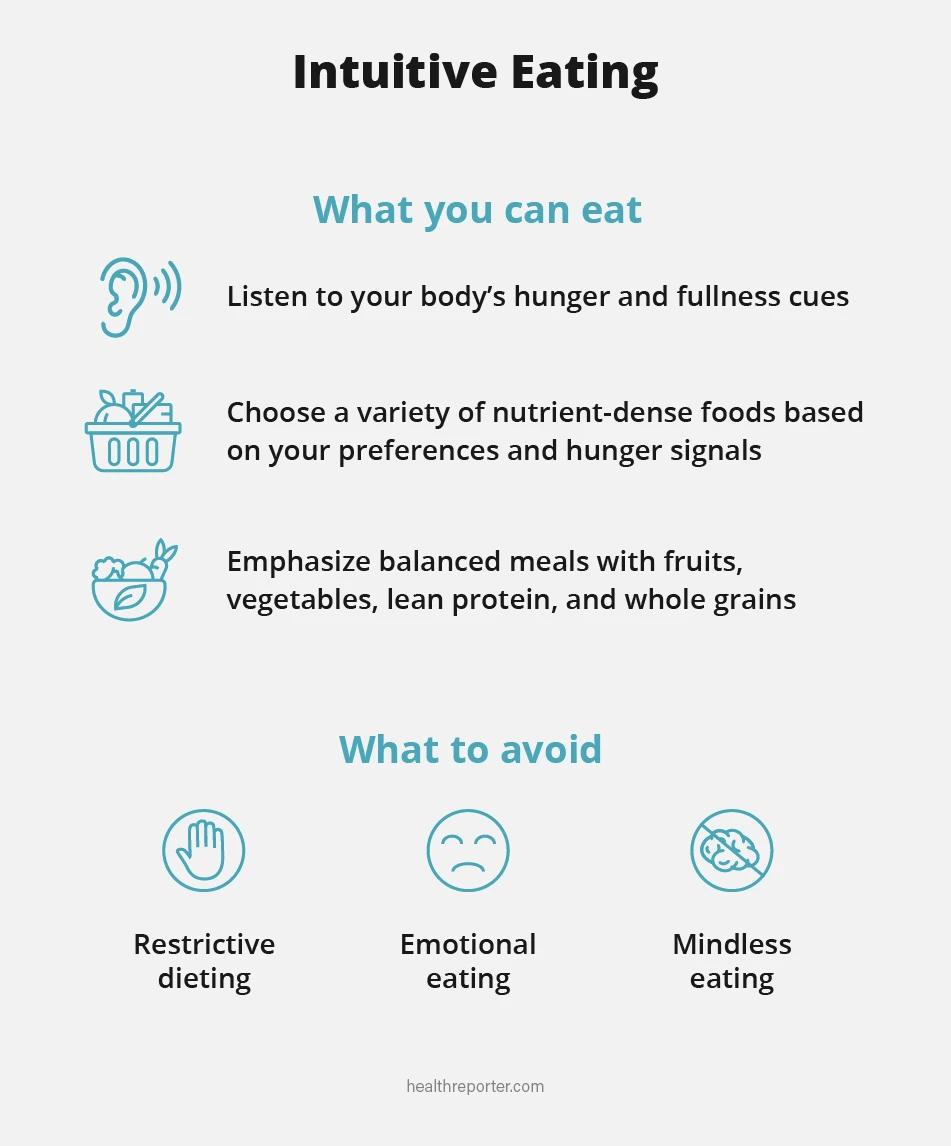
Intuitive eating is not a weight loss diet. However, it is included on this list of 10 best weight loss diets because it teaches you to identify and listen to your body’s physical and psychological needs and how to eat according to your hunger and satiety cues.
Therefore, people who eat intuitively are less likely to overeat and more likely to choose healthy foods, which may lead to weight loss. Research suggests that intuitive eating also promotes physical and mental health and a better relationship with food.
Intuitive eating empowers you to choose the foods you want to eat. Since all foods are allowed, it removes the negative association with foods that are typically avoided, such as chocolate and burgers, reducing binging.
Because you become more aware of what your body wants and needs, your food choices gradually shift away from refined, high-calorie foods to more healthy foods and balanced meals in the right portions for you.
Intuitive eating promotes the development of healthy habits over time which help you lose weight and enjoy better health. You won’t lose weight quickly by eating intuitively. However, it is easier to maintain your weight loss.
Intuitive eating is a long-term commitment that requires continued motivation and commitment. Using affirmations can help boost your self-esteem and promote positive self-talk to keep you on track.
- Sustainable weight loss
- Improved overall health
- Better relationship with food
- Personalized
- No structure
- Weight loss is slow
- Long-term commitment
A Word From a Nutritionist
While the latest fad diet may promise rapid, long-lasting weight loss, achieving your weight loss goals without harming your health can only be done with healthy eating.
You must reduce your calorie intake if you want to lose weight; however, cutting out an entire food group and severely restricting your daily calories to do so will harm your health.
A low-carb diet works and is associated with several health benefits. However, it can be challenging to maintain low-carb eating. Diets such as the Mediterranean diet, DASH diet, and plant-based diets include foods from all food groups that are more balanced and easier to stick to in the long run.
One of the biggest weight loss challenges is maintaining your discipline and motivation. Having the support of healthcare professionals, friends, and family can make it easier to achieve your goals.
You can also use apps to help you plan your diet and track your progress. The best weight loss apps promote a healthy diet and exercise and provide ongoing support on your weight loss journey.
FAQs
The ideal rate of weight loss is 1–2 pounds per week. Therefore, the amount of time it takes to lose weight depends on how much you have to lose, the type of diet you follow, and your metabolism.
It is not possible to lose 20 pounds in a month. Losing weight slowly means you are more likely to develop healthy eating habits and maintain your weight loss. It is more realistic to aim to lose 2 pounds per week.
A healthy, balanced diet is the best way to reduce belly fat. Include plenty of fruit, vegetables, whole grains, lean protein, and healthy fats, and avoid trans fats, saturated fats, and large portions.
Conclusion
The best diet for weight loss is one you can stick to and offers health benefits as well as helping you lose weight.
Therefore, diets such as the Mediterranean diet, DASH diet, and MIND diet that promote a healthy diet, as well as other healthy habits, are the best way to shed extra pounds for good.

















































 Select your language:
Select your language: 










